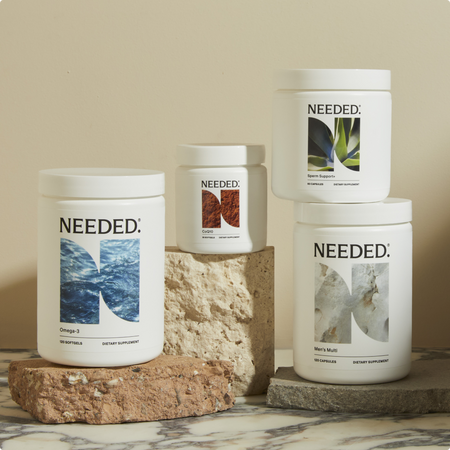Do I Need Perimenopause Supplements?
Menopause isn’t a sudden change. Quite the opposite; it’s a transition that takes several years, and during that time, you may experience some common menopausal symptoms like hot flashes, fatigue, and vaginal dryness. A well-rounded supplement can help support your overall health and wellness during this transition–but what should you look for? This guide breaks down the minerals and vitamins that may help alleviate perimenopausal symptoms.
What is Perimenopause?
Perimenopause (coming from the Greek word ‘peripeteia,’ which means a turning point) is the period of time before menopause, which is when a woman stops ovulating. During perimenopause, the ovaries gradually stop producing eggs, and estrogen levels slowly decrease. These processes often lead to a number of symptoms, including:
- Vasomotor symptoms like hot flashes and night sweats
- Vaginal dryness, painful sexual intercourse, irritation and inflammation, and dysuria (pain or irritation when urinating)
- Mood swings, increased anxiety or feelings of depression
- Weight fluctuations, dry skin, and hair loss
- High blood pressure
For some, symptoms can be debilitating, impacting their overall quality of life. With the average duration of perimenopause between 4 and 8 years, it’s no wonder women seek answers on anything that can help.
Luckily, research points to several vitamins and minerals that may support you during this transition.
Key Vitamins for Perimenopause
Our nutritional needs naturally change as we age, and no time is that more evident than during the premenopausal years. As women transition, they often experience a range of symptoms. Furthermore, deficiencies in key vitamins and minerals can intensify these symptoms, potentially diminishing your quality of life. Let’s explore a few vitamins and minerals that may help.
Omega-3 Fatty Acids
We cannot sing the praises of Omega-3 enough. It supports heart health, cognitive function and inflammation. Heart health is critical during the MT years, as women's chance of cardiovascular issues increases at the onset of menopause.
Needed’s Omega-3 delivers a high potency dose of 1000mg DHA and 1000mg EPA (per 4 gel caps) to support cognitive, cardiovascular and hormonal health.
Magnesium
Magnesium is the human body’s unsung hero. It’s a factor in over 300 biochemical reactions, supports muscle and nerve function, and regulates blood glucose levels and energy. Fatigue and diminished sleep quality are two of perimenopause’s many symptoms, and magnesium has been extensively studied for supporting restful sleep.
Needed’s Sleep + Relaxation Support is a melatonin-free supplement formulated to support optimal sleep quality.
Choline
Choline is an essential nutrient, but few people are aware of its importance, and as many as 90% of people don’t meet the recommended daily intake. Choline plays a role in metabolism, cognition, and maintaining a healthy nervous system, all of which can be affected by symptoms of menopause.
Supplementing your diet to boost Choline intake can help support your mental and physical wellness.
Maca
Maca, a plant in the mustard family, has long been touted for its medicinal benefits, particularly for feminine hormone balance. In a systemic review, four studies showed some benefits for certain menopausal symptoms, though more research is needed.
Vitamin D and Calcium
Both Vitamin D and Calcium are essential throughout our lives, but they are critical during the premenopausal, menopausal and postmenopausal years. Did you know that ten million people have osteoporosis, and 80% of them are women? Or close to 20% of bone loss happens during the menopausal years? Vitamin D and calcium are important to support bone health; the deficiency risk increases with age and menopause.
Needed’s Prenatal Vitamin D contains Vitamin D3/K2, which work together for optimal immune function and bone health.
Collagen Peptides
Collagen is one of the most abundant proteins found in the body and serves as the connective tissue for our tendons, ligaments and muscles. Unfortunately, we lose collagen as we age; by 40, we’ve lost 24% of our body’s collagen, and collagen production slows down. Decreased collagen levels impact our skin, hair, nails, bone and joint health, among many other things. While many collagen supplements are on the market, they aren’t all created equal. Hydrolyzed collagen, or collagen peptides, are smaller and easier to digest.
The Needed Hydrolyzed Collagen is ethically sourced from the hides of grass-fed, pasture-raised, hormone-free bovines.
How to Choose the Right Perimenopause Supplements
Choosing the right perimenopause supplements starts with quality—opt for third-party tested products to ensure safety and effectiveness. Your individual health needs matter, too—whether you're managing bone health, heart health, or sleep disturbances, the right supplement can make a difference. Before adding anything new to your routine, consult a healthcare provider to ensure it’s safe and tailored to your body’s needs.
Bottom Line
Perimenopause is a gradual transition, not a sudden shift, and during this time, supporting your body’s changing needs is essential. While supplements can help manage common symptoms like hot flashes, fatigue, and hormonal imbalances, they work best alongside a balanced diet, regular exercise, and healthy lifestyle choices.
Ensuring you get the right vitamins and minerals can make a real difference, but it’s equally important to consult a healthcare provider for personalized guidance. Every woman’s journey is unique, and a tailored approach will help you navigate this phase with confidence and well-being.















